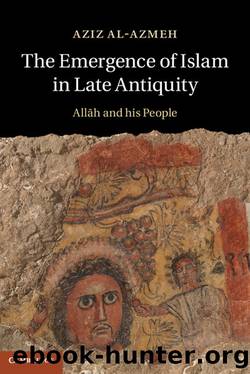The Emergence of Islam in Late Antiquity by Aziz Al-Azmeh

Author:Aziz Al-Azmeh [Al-Azmeh]
Language: eng
Format: epub
Publisher: Cambridge University Press
Published: 2017-02-08T16:00:00+00:00
Space, time and divinity reconfigured
The subordination of multiple divinities to the supreme deity involved two major movements, the one conceptual and the other practical, at once cultic and social. The latter involved cultic centralisation by an emergent, exclusive cultic association, with cultic worship being directed to the one supreme being to the exclusion of others. Allied with this latter was the conceptual movement expressed in the connotative and conceptual expansion of AllÄh, as he moved on from the preternatural world to create the space for conceiving the supernatural realm. This involved centrally the recasting of categories of the supernatural and divine, and the reclassification of their members. This classification moved from the relative parity, commensurability, porosity of borders, and translatability or at least mutual recognisability of divinities known to polytheism, be they called rabb, ilÄh, jinni or mal'ak, all of which might have been regarded indifferently as daemones and theoi by the ancient Greeks, to a hierarchy within the supernatural realm. This categorical reconfiguration of the preternatural and the conceptual incipience of the supernatural yielded a ranking which, in the standard henotheistic manner, set up an instance in the divine world to which other categories of the supernatural were subordinated. Muslim traditions speak of Muḥammad instructing âUmar b. al-Khaá¹á¹Äb and AbÅ« Bakr that, upon their conversion, they are expected to disavow al-andÄd, AllÄh's associates,268 that is to say, not to fall into shirk, associationism.
This formed a constituent part of the eventual move from a combined scheme of monolatry and henotheism, the former cultic and the latter conceptual, to monotheism. We witness here, in standard manner, categories of certain supernatural beings not only demoted in rank, efficacy and energy, but also made to submit to the supreme deity, now declared uniquely divine, all the while preserving for these other beings a supernatural status as actors, while being removed from the category of divinity, now dissolved as a general category and become the descriptive characteristic of one supreme being: only AllÄh was to remain divine, the others uncanny and preternatural, or otherwise (and this applies to angels) belonging to a derivative, secondary order of sublimity. This also involved on occasion the denial and indeed the extirpation of some erstwhile divinities: in the case of Muḥammad, we see clearly a double movement whereby deities properly so called, the Äliha or arbÄb, were declared to be chimerical and ineffectual, and eventually had their cults extirpated, while those supernatural beings whose worship, veneration or propitiation did not have a cultic infrastructure â jinn and angels, and devils as well â were not denied, but were Islamised and made to be subservient to and created by the supreme being.269
This pairing of cultic restrictiveness and exclusivity with a measure of conceptual permissiveness in the understanding of supernatural categories was noted by an early exegete. MuqÄtil b. SulaymÄn (d. 767) spoke suggestively of âal-shirk fiâá¹-á¹Äâa, dÅ«na âibÄdaâ,270 associationism of obedience, not of worship, taking note of the plurality of supernatural potencies in a subordinationist economy of the supernatural.
Download
This site does not store any files on its server. We only index and link to content provided by other sites. Please contact the content providers to delete copyright contents if any and email us, we'll remove relevant links or contents immediately.
| Africa | Americas |
| Arctic & Antarctica | Asia |
| Australia & Oceania | Europe |
| Middle East | Russia |
| United States | World |
| Ancient Civilizations | Military |
| Historical Study & Educational Resources |
The Battle of Mogadishu by Matt Eversmann & Dan Schilling(754)
The Confidence Men by Margalit Fox(708)
The Spymaster of Baghdad by Margaret Coker(675)
A History of the Muslim World since 1260: The Making of a Global Community by Vernon O. Egger(671)
Jack the Ripper and the East End by Peter Ackroyd(635)
Empire of Fear: Inside the Islamic State by Andrew Hosken(621)
The Afghanistan File by Prince Turki AlFaisal Al Saud(613)
Islam At The Gates: How Christendom Defeated the Ottoman Turks by Diane Moczar(608)
Akhenaten by Dominic Montserrat(606)
The Crimean War by Winfried Baumgart(602)
The Jerusalem Diamond by Noah Gordon(594)
Beirut 2020 by Charif Majdalani(590)
The History of Jihad by Robert Spencer(587)
A Concise History of Greece (Cambridge Concise Histories) by Richard Clogg(584)
The Privatization of Israeli Security by Shir Hever(561)
Enemy in the East by Rolf-Dieter Müller(559)
Israel: Ancient Kingdom or Late Invention? by Daniel I. Block(557)
The Nine Lives of Pakistan by Declan WALSH(552)
Destroying a Nation: The Civil War in Syria by Nikolaos van Dam(547)
